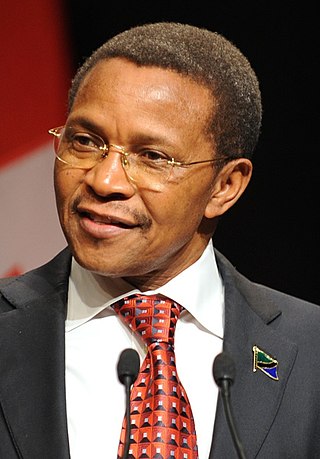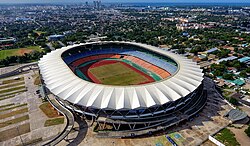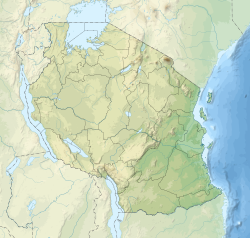
Jakaya Mrisho Kikwete is a Tanzanian politician who was the fourth president of Tanzania, in office from 2005 to 2015.
Joseph Sinde Warioba served as Prime Minister of Tanzania from 1985 to 1990. Furthermore, he served concurrently as the country's Vice President. He has also served as a judge on the East African Court of Justice, and as chairman of the Tanzanian Constitutional Review Commission.

Edward Ngoyai Lowassa is a Tanzanian politician who was Prime Minister of Tanzania from 2005 to 2008, serving under President Jakaya Kikwete. Lowassa has gone into record as the first Prime Minister to have been forced to resign by a fraud scandal in the history of Tanzania. Following his resignation President Kikwete was obliged to dissolve his cabinet as required by the Constitution and with minimum delay, constituted a new one under a new Prime Minister, Mizengo Pinda.

The Tanzania Football Federation previously the Football Association of Tanzania, is the governing body of football in Tanzania. It oversees operations of the Tanzania national football team, Tanzania women's national team and the Tanzanian football league system which comprises the Tanzanian Premier League, Tanzanian First Division League (Championship), First League and Regional Champions League. It was founded in 1945 and has been affiliated with FIFA since 1964. Wallace Karia is the current President of the Tanzania Football Federation as of 2017.

Salma Kikwete is a Tanzanian educator, activist, and politician who served as the First Lady of Tanzania from 2005 to 2015 as the wife of Tanzanian President Jakaya Kikwete.

Tanzania – United States relations are bilateral relations between Tanzania and the United States.
Kabanga is a ward in the Ngara District of the Kagera Region in Tanzania near the Burundian border. Wahagaza are the indigenous of Ngara. In 2016 the Tanzania National Bureau of Statistics report there were 24,979 people in the ward, from 22,010 in 2012.

The 2010 CECAFA Senior Challenge Cup is the 34th edition of the competition. The host of the tournament is Tanzania.

The 2011 CECAFA Cup was an international football competition consisting of East and Central African national teams. It was the 35th edition of the annual CECAFA Cup. The tournament was hosted by Tanzania for the second consecutive year and seventh time overall.

India–Tanzania relations refers to the current and historical relations between India and Tanzania. India has a High Commission in Dar es Salaam, Tanzania has a High Commission in New Delhi, which is also accredited to Sri Lanka, Nepal, Bangladesh and Myanmar. Diplomatic relations are described as close, friendly and cooperative. 15,000 Indians visited Tanzania in 2007. In May 2011, Ex Prime Minister of India Manmohan Singh calls for strengthen cooperation with Tanzania. Trade between India and Tanzania amounted to 31 billion dollars in 2009–2010 and India is Tanzania's second-largest investor.
The 2012 Kagame Interclub Cup was the 37th edition of the Kagame Interclub Cup, which is organised by CECAFA. It began on 14 July and ended on 28 July 2012. Tanzania hosted the tournament for their eleventh time since it officially began in 1974, when they were also hosts. The tournament made Wau Salaam the first South Sudanese club to take part in an international club tournament.

The Dar es Salaam building collapse occurred during the early hours of Good Friday on 29 March 2013 when a 16-floor residential apartment building collapsed on a nearby mosque compound, killing 36 people and trapping over 60 under the rubble.
Ally Kleist Sykes was a veteran Tanzanian politician and one of the 17 founders of the Tanganyika African National Union.
General elections were held in Tanzania on 25 October 2015. Voters elected the president, members of Parliament, and local government councillors. By convention, the election was held on the last Sunday of October and was supervised by the National Electoral Commission (NEC). Political campaigns commenced on 22 August and ceased a day before the polling day.
Burundi–Tanzania relations are bilateral relations between Burundi and Tanzania. Burundi is a strategic partner of Tanzania in many areas, particularly trade. Since Burundi is a landlocked country, almost 80% of its goods are moved through by road to Dar es Salaam Port. Tanzania has also been a strategic partner in mediating the political tensions in the country. Both countries are members of the African Union.

Tanzania– Zambia relations are bilateral relations between Tanzania and Zambia. Tanzania and Zambia are one of the oldest allies in the region and together formed the front line nations for independence for neighboring African nations.

Tanzania Mercantile Exchange is a commodity exchange in Tanzania. The commodities exchange is put in place to help various farmers access the domestic and global market better and obtain a fair price in selling of their produce. The exchange is currently undergoing training of their staff and is and has begun pilot trading in Sesame Seeds and Green Grams. The exchange plans to trade in coffee, cashew nuts, sesame, rice, sunflowers and maize, which are all currently traded under the warehouse receipt system. The Capital Market and Securities Authority (CMSA) currently oversees the operations of the exchange and is in the process of educating farmers to use the system, however, many farmers are skeptical to the system.
Herman Cornel Lupogo was a Tanzanian military officer and government administrator. After graduating from Makerere University, he enlisted in the Tanzania People's Defence Force in 1965. He held various positions in the army, including head of the National Leadership Academy, and served as a brigadier during the Uganda–Tanzania War of 1978 and 1979. He retired with the rank of major general in 1992, and subsequently worked as a government administrator. He chaired the Tanzania Commission for AIDS from 2001 until 2007, and died in 2014.

South Africa–Tanzania relations are bilateral relations between South Africa and Tanzania. Both countries are members of the African Union, Southern African Development Community and Commonwealth of Nations.

France–Tanzania relations are bilateral relations between France and Tanzania.














